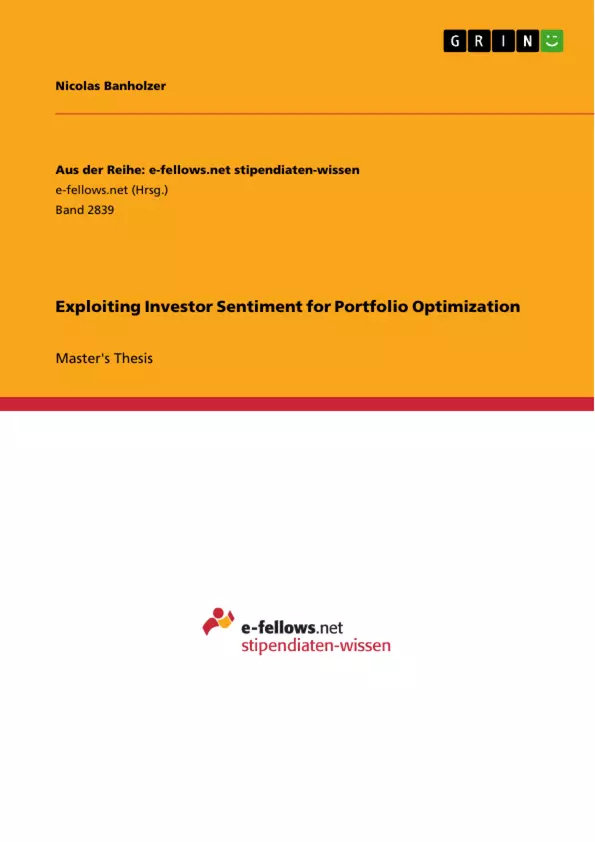In efficient financial markets, there is no room for sentimental investors. Any new information would be immediately absorbed and any mispricing immediately corrected by the forces of rational arbitrageurs doing the maths with the fundamentals. But why should financial markets be different from any other market where humans interact and are subject to psychological biases? There is strong empirical evidence that investor sentiment, broadly defined as "a belief about future cash flows and investment risks that is not justified by the facts at hand", plays an important role in financial markets. It can lead to significant overpricing/underpricing, particularly of assets prone to subjective valuations. With limits/risks to arbitrage in the short term, prices rather correct over the medium to long term as sentimental beliefs mean-revert. Building on the studies by Baker and Wurgler 2006 and Baker, Wurgler, and Y. Yuan 2012, measures of investor sentiment for international markets are constructed. Using the Copula Opinion Pooling approach developed by Attilio Meucci, this thesis shows how to incorporate these sentiment measures into portfolio optimization. Thereby, a sentiment-based trading strategy that exploits the medium-term reversal effect of sentiment is developed and empirically tested. The results are promising as they provide strong evidence that sentiment contains beneficial information that should not be neglected by quantitative portfolio managers.
Inhaltsverzeichnis (Table of Contents)
- Introduction
- Studies about Sentiment
- Sentiment by Surveys
- Sentiment by Financial Variables
- Sentiment by News
- Research Questions
- Empirical Methodology
- Sentiment Data
- Sentiment Index Computation
- Incorporating Sentiment into the Portfolio
- Black-Litterman Approach
- Copula Opinion Pooling
- Portfolio Optimization
- Empirical Approach
- Performance Measurement and Benchmarks
- Results
- Training Period Results
- Test Period Results
- Robustness Checks
- Discussion
- Sentiment Effect by Market
- Sentiment Effect by Sign
- Sentiment Effect by Business Cycle
Zielsetzung und Themenschwerpunkte (Objectives and Key Themes)
This thesis investigates the impact of investor sentiment on international financial markets. It aims to develop and test a sentiment-based trading strategy that exploits the medium-term reversal effect of sentiment. The study utilizes the Copula Opinion Pooling approach to incorporate sentiment measures into portfolio optimization, aiming to demonstrate the value of sentiment information for quantitative portfolio managers.
- Investor sentiment and its influence on financial markets
- Measuring and incorporating sentiment into portfolio optimization
- Developing and testing a sentiment-based trading strategy
- The medium-term reversal effect of sentiment
- The value of sentiment information for quantitative portfolio management
Zusammenfassung der Kapitel (Chapter Summaries)
- Introduction: This chapter introduces the concept of investor sentiment and its importance in financial markets. It reviews existing studies on sentiment, focusing on surveys, financial variables, and news-based approaches. The chapter also outlines the research questions addressed in the thesis.
- Empirical Methodology: This chapter details the methodology used to collect and analyze sentiment data. It describes the construction of sentiment indices using the Copula Opinion Pooling approach and explains how sentiment is incorporated into portfolio optimization. The chapter also outlines the empirical approach, performance measurement metrics, and benchmarks used in the study.
- Results: This chapter presents the results of the empirical analysis. It discusses the performance of the sentiment-based trading strategy during both the training and test periods. Robustness checks are also conducted to ensure the reliability of the findings.
- Discussion: This chapter discusses the findings in detail, analyzing the sentiment effect by market, sign of the sentiment index, and business cycle.
Schlüsselwörter (Keywords)
Investor sentiment, financial markets, portfolio optimization, Copula Opinion Pooling, sentiment-based trading strategy, medium-term reversal effect, quantitative portfolio management.
Frequently Asked Questions
What is investor sentiment in financial markets?
Investor sentiment is defined as a belief about future cash flows and investment risks that is not justified by current facts, often leading to asset mispricing.
What is the "medium-term reversal effect" mentioned in the thesis?
It is the tendency for asset prices that were over- or underpriced due to sentiment to revert back to their fundamental value over a medium-to-long-term period.
Which methodology is used to incorporate sentiment into portfolio optimization?
The thesis utilizes the Copula Opinion Pooling approach, developed by Attilio Meucci, to integrate sentiment measures into quantitative models.
What are the primary sources for measuring sentiment?
The study constructs indices based on surveys, financial variables, and news-based data, building on works by Baker and Wurgler.
What were the results of the sentiment-based trading strategy?
The results provided strong evidence that sentiment contains beneficial information for quantitative portfolio managers and can improve portfolio performance.
Does the sentiment effect vary across different markets?
Yes, the thesis discusses how the sentiment effect differs by market, the sign of the sentiment, and the current stage of the business cycle.
- Citation du texte
- Nicolas Banholzer (Auteur), 2018, Exploiting Investor Sentiment for Portfolio Optimization, Munich, GRIN Verlag, https://www.grin.com/document/425070



